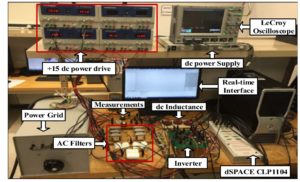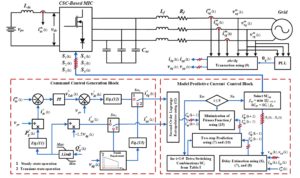Summary:
Control of power systems such as DC-AC and DC-DC inverters is an essential task for the reliability of systems. Here we focus on control of three-phase power current source and voltage source converters. Due to resource limitations such as the speed of the processor, the accuracy of sensors, faults and model uncertainties, designing an efficient and resilient controller is a challenging task. This research area focuses on the concept of three-phase module-integrated converters (MICs) incorporated in grid-tied large-scale photovoltaic (PV) systems. The current-source converter with dc voltage boost capability, namely the single-stage power conversion system, is used for the three-phase PV MIC system. The focus is to design control techniques to control the active and reactive power simultaneously while the system model includes uncertainties and is under faults and attacks. In our latest work, a model predictive scheme with low switching frequency is designed to control the proposed topology in such a way that provides a certain amount of active and reactive power in steady-state operation and also provides a proper ratio of reactive power under transient conditions to meet the low-voltage ride through regulations. To predict the future behavior of current control values and switching states, a discrete-time model of the MIC is developed in the synchronous reference frame. It is demonstrated that the injected active and reactive power can be controlled by minimizing the cost function introduced in the predictive switching algorithm. The proposed structure is simulated in MATLAB/SIMULINK software. Experimental verification is provided to justify the performance of the proposed control method through a 300-VA laboratory prototype. The results verify the desired performance of the proposed control scheme for exchanging both active and reactive powers between the PV MIC and the grid within different operating conditions.
Selected publications:
- A. Moghadasi, A. Sargolzaei, A. Anzalchi, M. Moghaddami, A. Khalilnejad, and A. Sarwat, “A Model Predictive Power Control Approach for a Three-Phase Single-Stage Grid-Tied PV Module-Integrated Converter,” in IEEE Transactions on Industry Applications, vol. 54, no. 2, pp. 1823-1831, March-April 2018.
- Moghadasi, A., A. Sargolzaei, M. Moghaddami, A. I. Sarwat, and Kan Yen. “Active and reactive power control method for three-phase PV module-integrated converter based on a single-stage inverter.” In Applied Power Electronics Conference and Exposition (APEC), 2017 IEEE, pp. 1357-1362. IEEE, 2017.
- Moghadasi, Amir, Arman Sargolzaei, Masood Moghaddami, Aditya Sundararajan, Arif Sarwat, and Kang Yen. “A simplified power control approach with reliable axis decoupling capability for three-phase current source inverter.” In Power Electronics, Drives and Energy Systems (PEDES), 2016 IEEE International Conference on, pp. 1-7. IEEE, 2016.
- Sargolzaei, Arman, Mahdi Jamei, Kang Yen, Arif I. Sarwat, and Mohamed Abdelghani. “Active/reactive power control of three phase grid connected current source boost inverter using particle swarm optimization.” In Progress in Systems Engineering, pp. 141-146. Springer, Cham, 2015.
- Sargolzaei, Arman, Amirhasan Moghadasi, Kang Yen, and Arif I. Sarwat. “Time-delay analysis on grid-connected three-phase current source inverter based on SVPWM switching pattern.” In Computational Intelligence Applications in Smart Grid (CIASG), 2014 IEEE Symposium on, pp. 1-5. IEEE, 2014.


